The saga of Dune expands with the premiere of Dune: Prophecy on HBO/Max, and there’s much to discuss in a packed episode. Let’s break it down!
“A beginning is the time for taking the most delicate care…” These words from Princess Irulan kicked off the entirety of the Dune saga and feels particularly relevant now. The first episode of any new show, let alone the first one for a beloved science fiction series over half a century old coming on the heels of two impressive film adaptations, is crucial. Not only does it need to establish the overall tone, it’s gotta be engaging enough to hook audiences for the remainder of the season.
For the most part, Dune: Prophecy‘s initial episode manages to succeed…though I think it’s in spite of the execution. Let’s break it down!
Spoiler Warning: I’ll be diving head first into spoilers for the first episode of Dune: Prophecy (with a few things here and there about some of the novels). So if you haven’t watched just yet, maybe come back after.
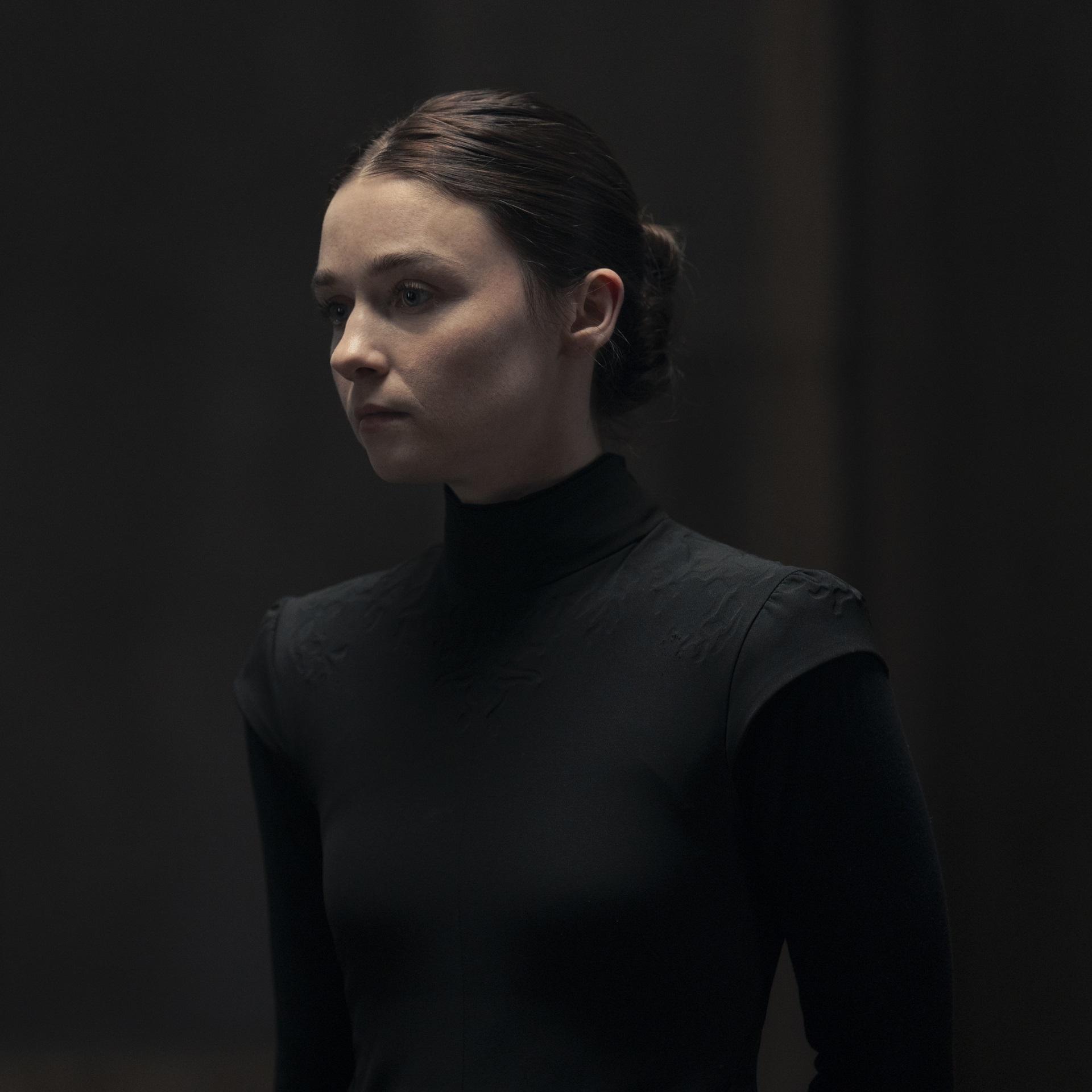
All About Timing
Before we get into the nitty gritty details, let’s talk about where Dune: Prophecy sits on the Dune timeline. The show itself is pretty upfront, giving us specific dates to coordinate with. But for those who’ve read the books and seen the marketing refer to the series as “based on the Sisterhood of Dune” novel, you might be a smidge confused, because it doesn’t actually center on the events in those books at all.
In fact, the closest we get is in the opening prologue with a young Valya. Valya and Dorotea coming together for Mother Superior Raquella’s death (and Valya’s use of the Voice to force Dorotea to kill herself), is something that took place during the Mentats of Dune novel. That was actually the middle chapter of the Great Schools of Dune trilogy (which Sisterhood started). Combine that with the subsequent time jump and we can surmise the show actually takes place after the events of that trilogy.
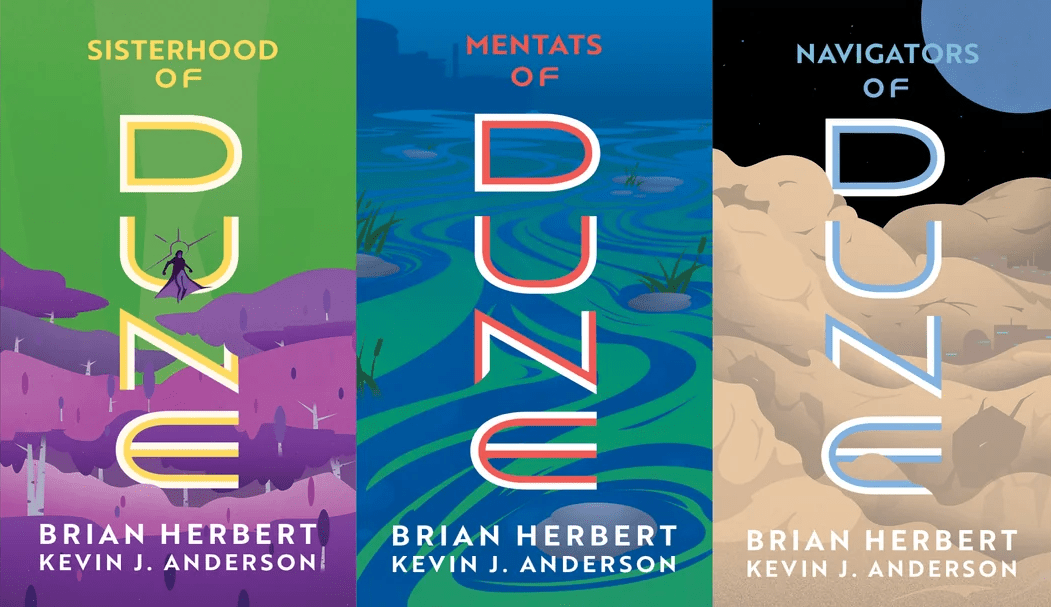
Once that realization set in, I was a bit relieved. While I enjoyed those novels quite a bit (definitely more than most), so much of that story is wrapped up in events/characters from the Butlerian Jihad trilogy. That’s a LOT of ground to cover without leaving a whole bunch of confusion in its wake.
Setting the events of the Prophecy afterwards, however, is an excellent compromise. It’s able to make reference to certain—larger—events (e.g. we got to see the Cymeks in action!!), that are easier to digest in bursts of exposition. It’s able to simply reference big events as things that happened “before,” without being beholden to the multitude of plots that comprised the Great Schools trilogy. Thus, major aspects of those novels like Vorian Atreides and his baggage, Erasmus, and even Manford Torondo’s fanaticism can be bypassed without being done away with entirely.

In this way, the show manages to put everyone, regardless of their knowledge of Dune lore (whether through books or just the movies), on the same page. It’s a level playing field as we’re now in uncharted territory with literally 10,000 years of time to play around in. This has multiple benefits. One, it gives the storyteller freedom to play around in the universe. Secondly, it any makes references to events within Brian Herbert and Kevin J. Anderson’s novels work as deep cut Easter eggs without leaving newcomers feeling lost or confused. Lastly, it ensures that even long-time diehard fans like myself are experiencing something all new and unable to guess where things are headed.
Considering the sheer amount lore at play here—especially being so close to the events of the Butlerian Jihad—this is something of a delicate balance to maintain. In this regard, Prophecy succeeds and left even a long-time fan like me, curious to see where the story was heading.

Pieces on the Board
By and large, this first episode is all about setting the stage for the rest of the season and the players involved. There’s a lot of ground to cover between establishing the status quo of the current era in time and the plethora of new characters to introduce. Within the first 14 minutes, we cover roughly a century worth of history, only to jump forward yet again another three decades. So yeah, things are moving quick, but I’m going to try and break down where things stand in the simplest way possible:
Valya Harkonnen serves as Mother Superior in the Bene Gesserit order, which has already spread it’s influence throughout the great houses of the Imperium. Valya seeks to expand that power even further by hoping to put a Sister on the Imperial Throne, in order to stave off the terrible threat Raquella Berto-Anirul spoke of in her final moments (the titular “Prophecy”).
To do so, the Witches have manufactured a crisis on Arrakis, where Emperor Javvico Corrino, oversees spice production. They’ve been attacking the Emperor’s harvesters, making it appear as if the Fremen are the primary problem, and thus forcing Javvico to more extreme measures to fight back…by brokering a deal with the Duke of House Richese for a fleet of high-tech warships.

In exchange for the ships that will help him regain control of Arrakis, the Emperor pledges his daughter’s (Ynez) hand in marriage to the Duke’s youngest son, Pruwet. The benefit for the Duke, of course, inching his family closer to the throne and propping himself up to potentially take over control of Arrakis.
Until he comes of age, however, Ynez will attend the Sisterhood’s school on Wallach IX. On the surface, it’s to keep her safe until Pruwet Richese is older and she’s ready to ascend the throne. But in reality, it’s to get her under control of the Sisterhood and indoctrinate her in the Bene Gesserit teachings.
Yet a new, unexpected, factor in the form of Desmond Hart has arrived. A man who’s motivations are yet unknown, but comes with a surprising amount of power. I’ll talk more about him in a bit, but his potential to spoil Valya’s plans seems to be the crux of the story being told in the show.

Meanwhile, Kasha has a premonition of her own that causes her to doubt the plans they’ve put into place and sends her running back to Wallach IX for guidance. Her brutal death, mirroring that of Pruwet’s, gives literal meaning to Raquella’s final words to Valya about seeing the “burning truth.”
Yes, there are other players involved, including the Imperial Swordmaster, Keiran Atredies, and the younger acolytes the show spends some time focusing on. I’m sure they’ll have bigger roles later on, but for the moment, they’re just kind of…there. Regardless, this is the primary information given to us in the episode which sets the stage for the season (series?) overall.
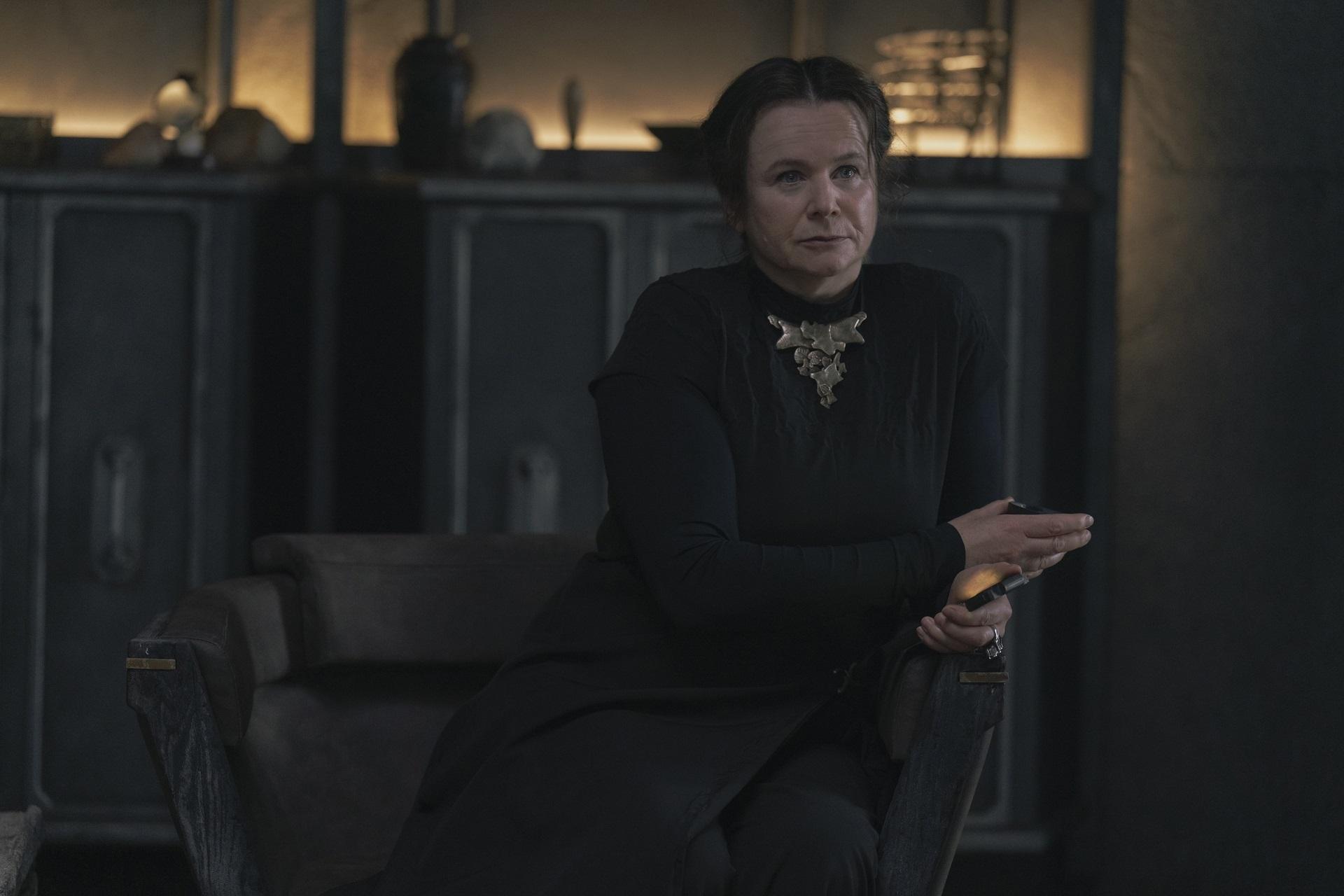
Fast Motion
Obviously, there’s a whole lot going on and even Emperor Javvico senses the myriad of forces lining up to try and wrest power from him. Whether it’s growing dissent/rebellion within the Imperium, the growing influence of the Bene Gesserit, and even House Richese’s flagrant disregard for the conventions banning Thinking Machines.
There’s a whole lot of political intrigue at play within the story and between the characters. It’s VERY much in line with what fans would expect from a Dune story, but something feels a bit off.
Before Game of Thrones, Dune was the standard of familial political intrigue on a grand scale in fiction. If you’ve ever heard the phrase/concept “plans within plans” it’s, more often than not, a direct reference to Dune. So it shouldn’t come as much of a surprise that Prophecy is setting the stage with multiple characters vying for control. The problem, however, is that it feels too much like it’s trying to be Game of Thrones, rather than Dune.
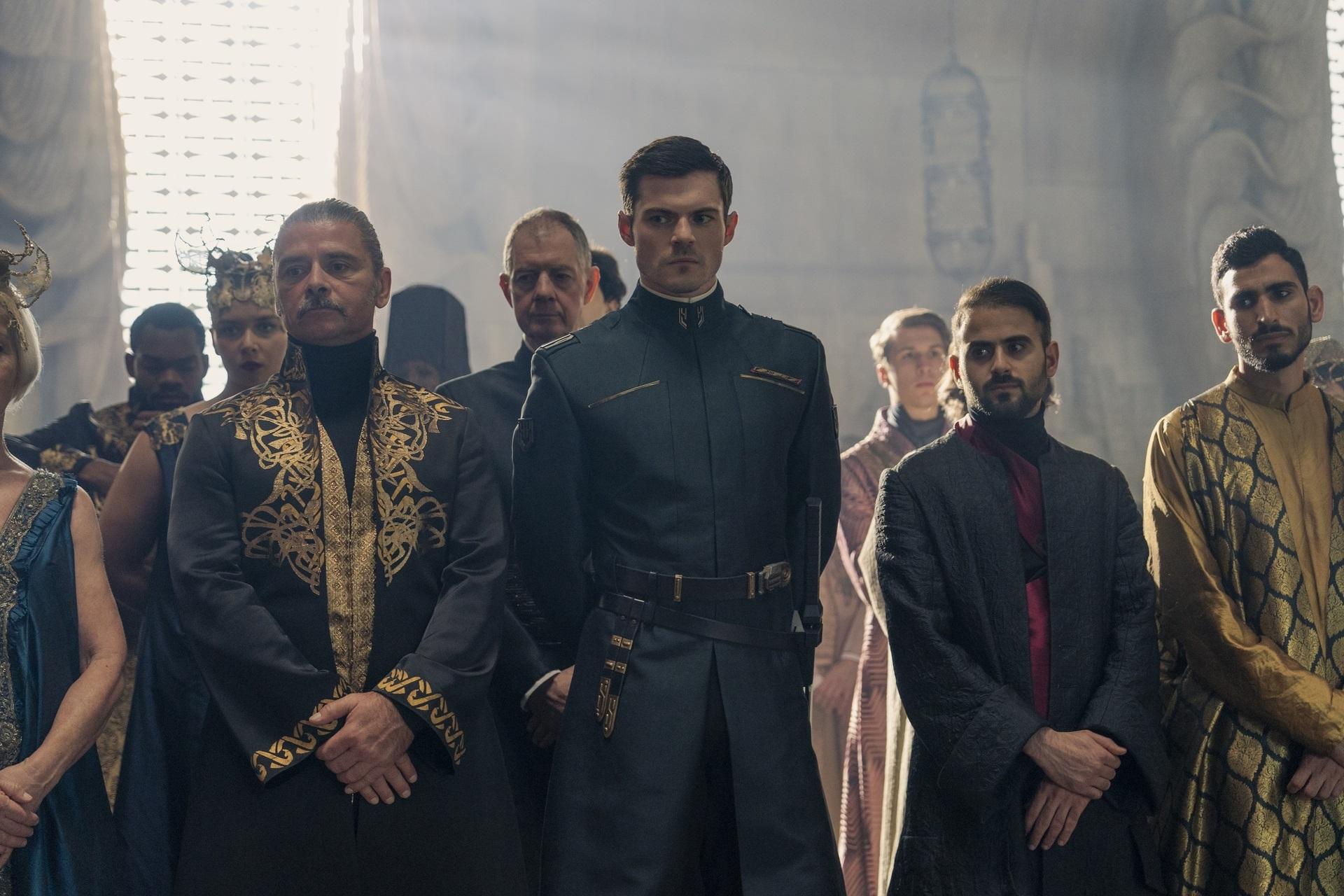
It’s hard to pinpoint exactly what’s going on here with it, but a major culprit is no doubt the overall pacing of this episode. Things move fast. Honestly, all the events happening in this episode could have easily been three to four episodes on its own. It’s clear there’s a specific story they want to tell (i.e. whatever is going on with Desmond versus the Sisterhood), and they just kind of speed-ran all the exposition needed to get there.
The result is a whole lot of “telling” instead of “showing.” While I’m happy to admit things did feel a little smoother on the second viewing, there’s no denying this first episode is in a bit of a rush. It’s more frustrating because when the show does slow down, you see how great it can be. Some of my favorite moments were the quieter ones.
The scene between Sister Lila and Jen (in their dormitory), along with the night time scene between Javvico and Desmond immediately stood out to me. Not only do they showcase the acting power the show brings to bear, but endears us to the characters beyond the exposition telling us we should care.
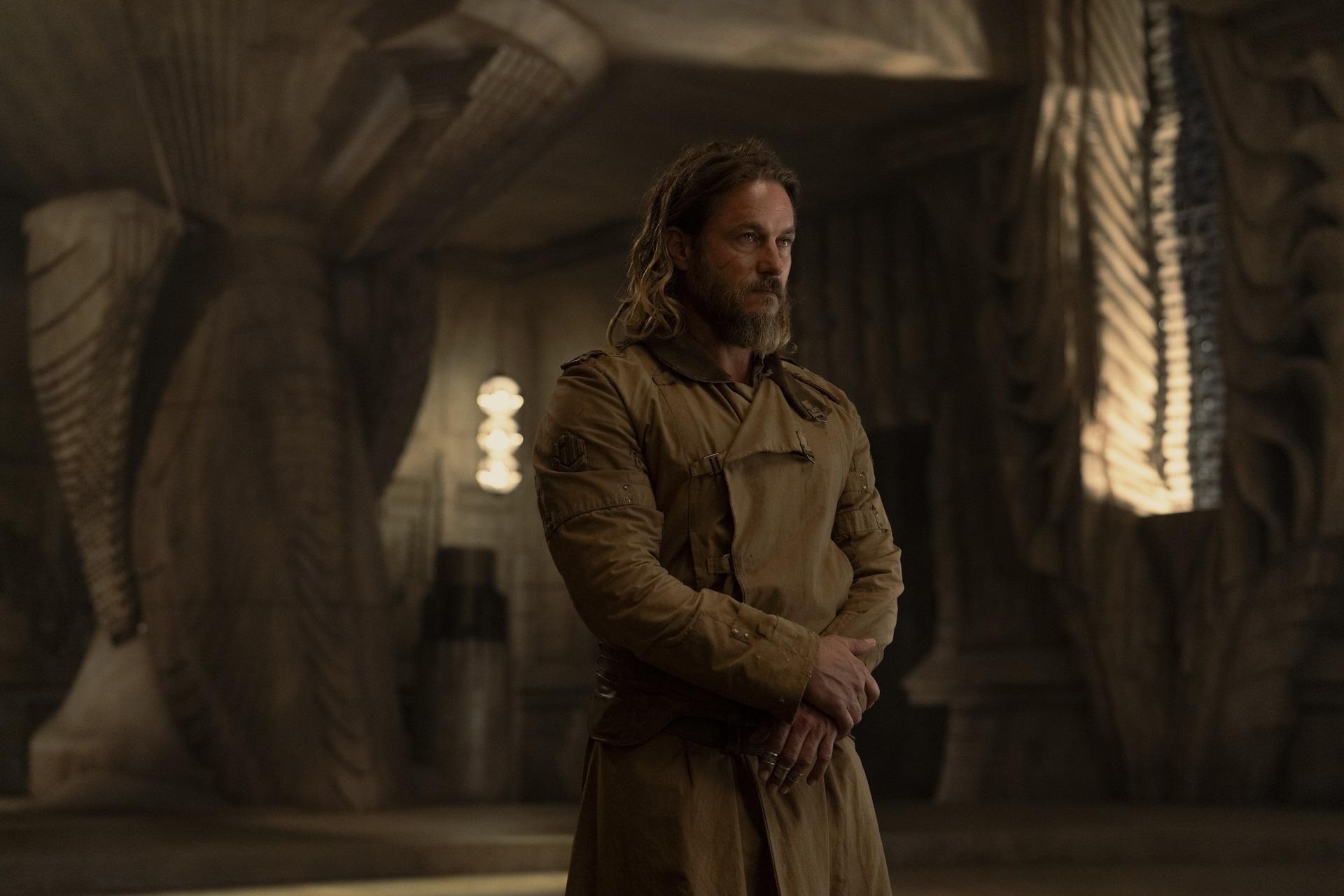
What’s Desmond Up To?
Keeping with the Game of Thrones comparison (it’s hard not to), another issue rears its head; there’s no one to really root for. Even in GoT there were characters you wanted to win—or at least do better—but Prophecy doesn’t offer us much in that regard. It’s so intent on setting up the fact everyone has their own schemes/agendas in play, it doesn’t give you anyone you want to cheer for.
Valya’s lust for power makes her immediately suspect; and I’m not convinced she diligently “checked the genetic archives” like she told her sister. Ynez feels like someone we should want to win, but she’s got some shadiness going on. And Ferdinand Richese feels specifically designed to be a sleazeball. Javvico might be the least awful choice here, but every Dune fan knows it’s tough to root for a Corrino.
The flip side of this, is we do have a really great new villain to hate: Desmond Hart. Whatever he’s up to, I hope he fails. From his introduction, it’s clear he’s up to something, with a touch of fanaticism to him that makes every conversation with him feel off-putting. It’s brilliant, and when you throw on his murder of the Richese child, you can’t help but despise him.
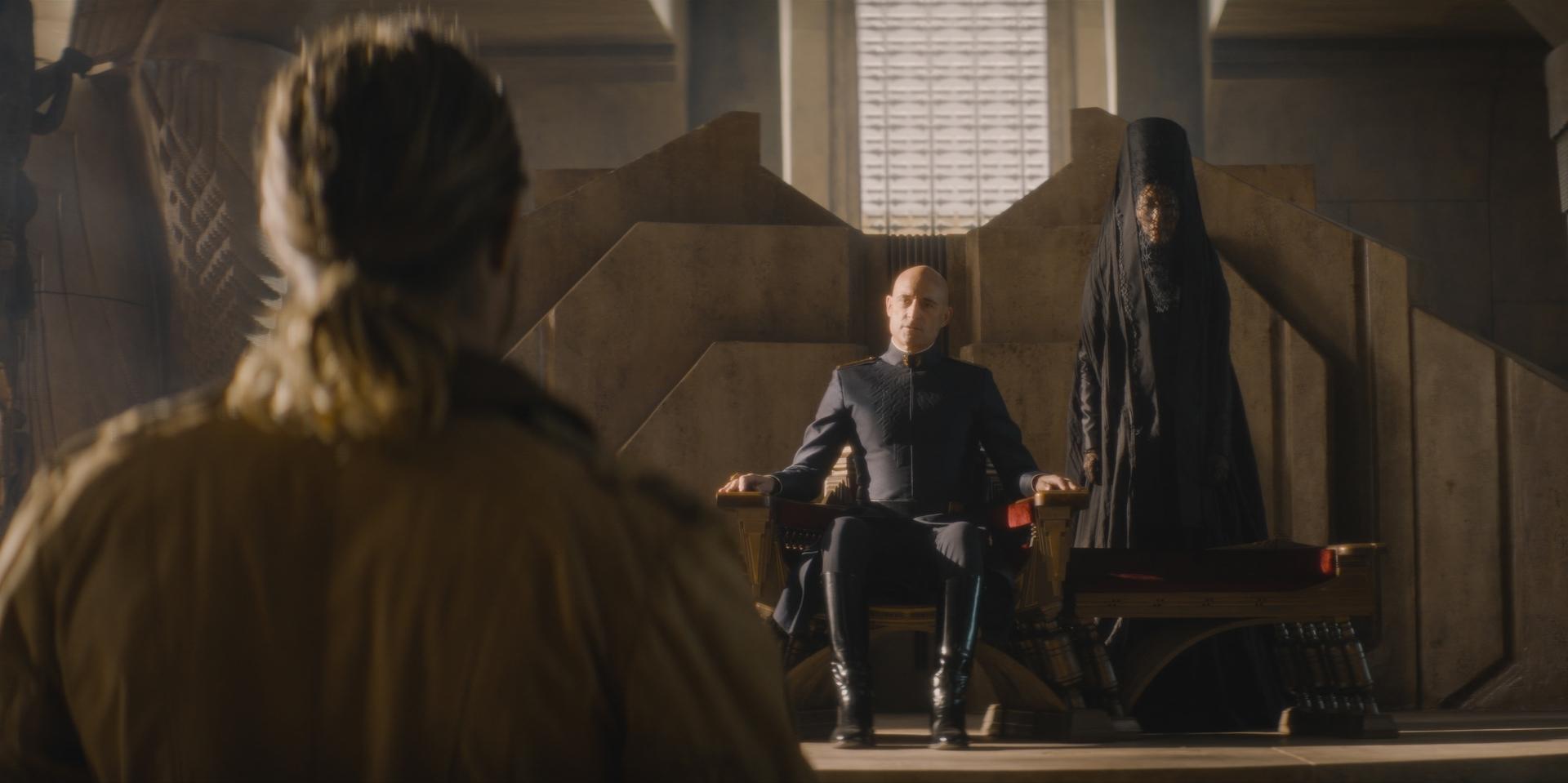
The real question, however, is what he’s up to. From what we’ve seen in the trailers, and what we see of him here, it’s clear he has something against the Bene Gesserit order. While his motives seems personal, he clearly has the support of a larger organization behind him. Who they are and what their ultimate goal is a mystery for the moment, but also serves as one of the show’s most engaging elements.
Not only am I real curious to know what type of poison he used against Pruwet Richese, I want to know how he was able to infect Kasha at the same time. Seems like the type of reach/power that could be very dangerous all around.
As a Dune fan, I have some theories as to who Desmond might be associated with: the Tleilaxu or the Butlerian cultists. In the original Dune novels the, Bene Tleilax are important/crucial villains throughout the series, but we’ve yet to see them mentioned in any of the adaptations. Considering the multitude of lore references Prophecy uses, it wouldn’t surprise me that this is where they make their first live-action appearance.
As for the Butlerians, they’re movement (led by Manford Torondo), were the primary antagonists in the Great Schools of Dune novels. Though Manford was ultimately defeated, it was clear the movement lived on. Perhaps we’re seeing its next incarnation? Either way, I’m intrigued and definitely eager to learn more.

Going Full Dune
For all the problems this initial episode seems to have, it’s still very much Dune. In fact, it may be more Dune than the movies it borrows aesthetics from. While it doesn’t dwell on certain things (often doesn’t have the time to), I was surprised at how deeply it got into the lore of Dune. It incorporates elements not only from the war against the machines, but makes very clear references/foreshadowing to the God Emperor and the events following his death.
Never, in a million years, would I have thought I’d see Cymeks on the screen, nor a mention of Arafel (or Kralizec). As such, it feels like Prophecy is exactly the kind of show Dune fans have been hoping to see for a long time, and it has potential to set the stage for bigger things down the road. I just hope the next few episodes in the series smooth things out in regards to the pacing and such.
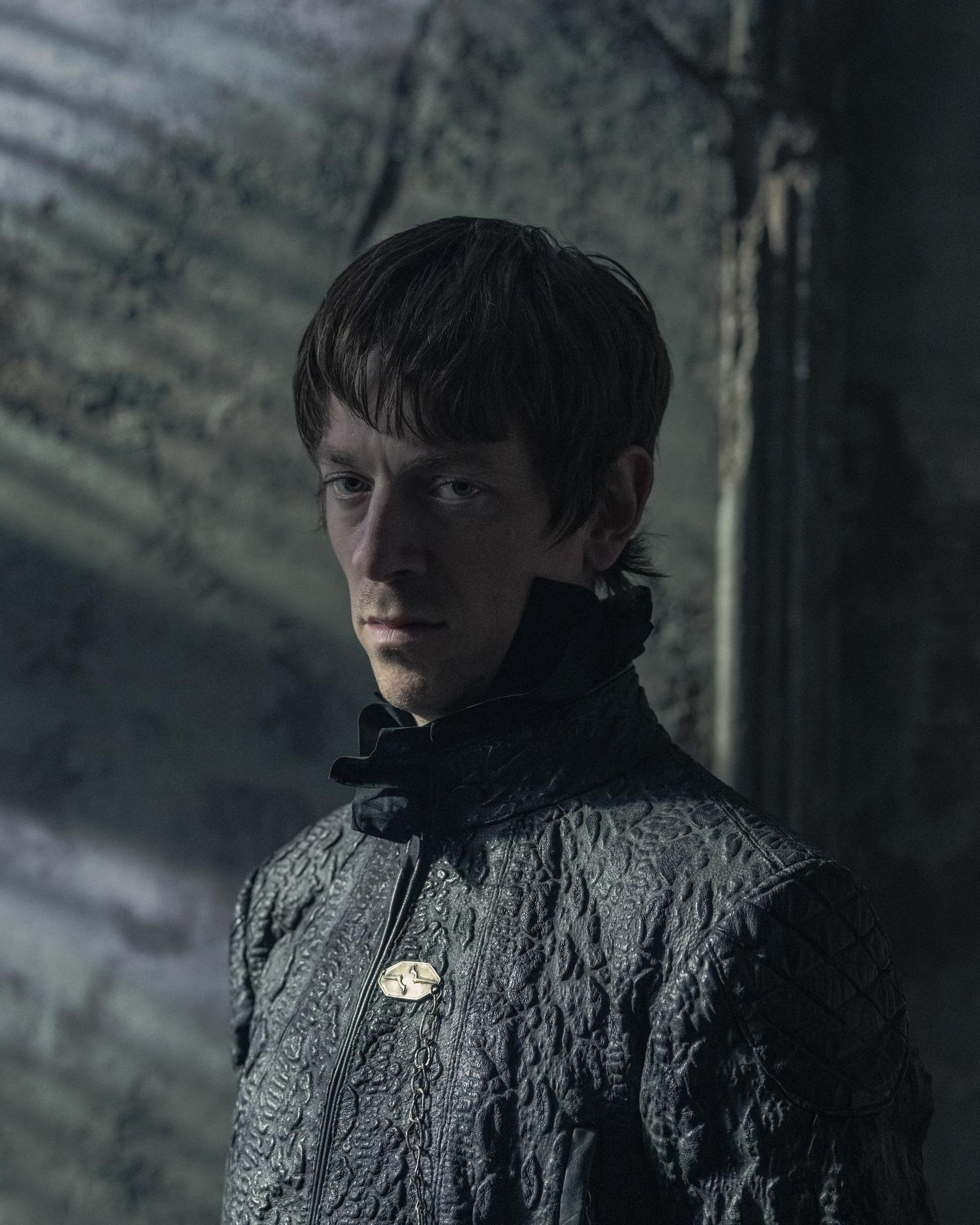
Easter Eggs
There are a number of Easter eggs sprinkled throughout this first episode for Dune fans (of all levels) to enjoy. While I mentioned some obvious ones already, here are a few that stood out to me while watching:
The Voice – In the books, Mother Superior Raquella is technically the first person to use “the Voice” technique, but it’s Valya Harkonnen who perfects it into the weapon we know in the original novels. It’s neat to see that play out in the first episode’s prologue, almost exactly as the novels portrayed it.
Tiran-Arafel – I have many thoughts on the mention of Tiran-Arafel that I have cooking for a separate article, but it was neat to see nonetheless. Arafel is something Duke Leto II (the God Emperor) referenced in the fourth Dune novel, some 3,500 years after the death of Paul Atreides. Arafel is something of an apocalypse, or Kralizec, the war at the end of the universe. Something crucial to the story of the final Dune novels.
The Tyrant – Along these same lines, Leto II was known as “the Tryant,” making young Kasha’s reference to “A holy judgment brought on by a tyrant” feel anything but coincidence.
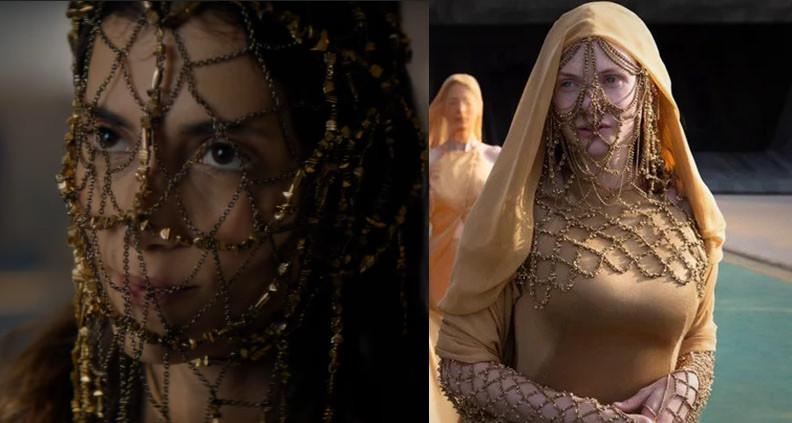
Wanderers of Harmonthep – Princess Ynez’s mother makes mention of the Wanderers of Harmonthep, a reference to the ancient Zensunni Wanderers who were the ancestors to the Fremen. Visually speaking, the headpiece she gives to Ynez when making the reference is similar to that worn by the Lady Jessica in Dune Part One.
Harrow Harkonnen and Lankiveil – We meet this era’s Baron Harkonnen in the form of Harrow, as he’s tries to convince the Emperor of the importance of Whale Fur at the wedding celebration. This, combined with the earlier footage of young Valya, is a direct reference to the Harkonnen home of Lankiveil. In the novels, this was the planet they controlled before Geidi Prime, and they worked as whalers before forsaking the name Harkonnen and instead going by Rabban…
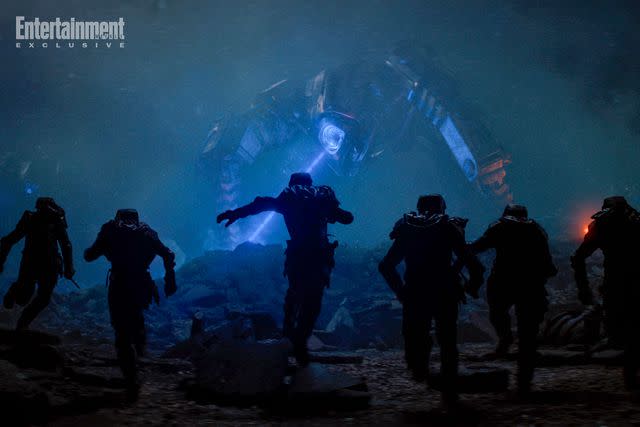
Cymeks – I know I’ve mentioned this a couple times but…WE GET TO SEE CYMEKS in action. These were the warriors who lead the charge against humanity in the war against the thinking machines. Just damn cool to see them brought to life.
Great Houses – Beyond House Richese, there are a number of Great Houses represented in the show that fans will instantly recognize. Of course, you’ll have to look at the credits to actually know who’s who, but it’s cool to see how much thought went into these things.
Baliset – During the wedding celebration, we see Prince Constantine playing the iconic Baliset.

All in all, this first episode of Dune: Prophecy is a mixed bag. They’ve done an excellent job making it line up, visually, with the films and it brings all the intrigue and lore Dune fans can handle. The problem is all in the execution as a bunch of exposition is rushed onto the screen.
The behind the scenes problems with the show are pretty well known, and it’s unfortunate that we can see some of that in the final product. Despite some execution wobbles, the story remains engaging enough to pull you along to the next chapter, but I really hope the remaining episodes smooth out a bit.

